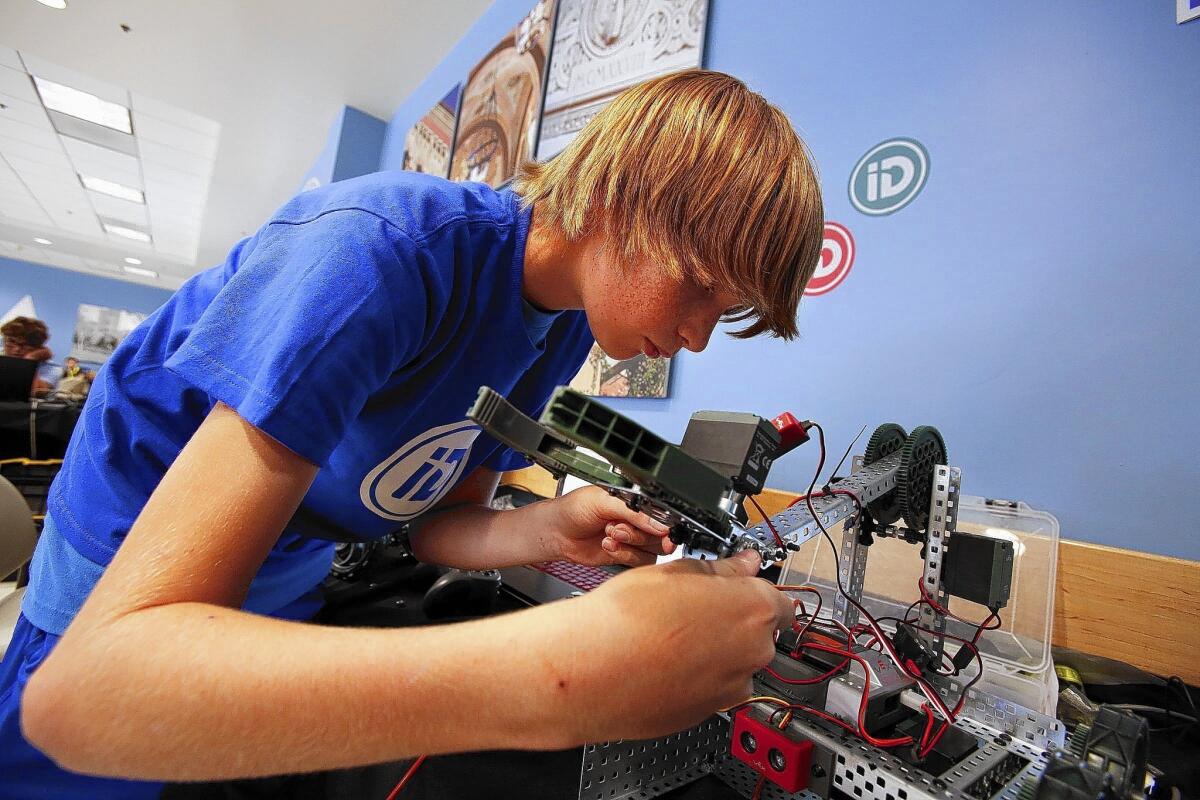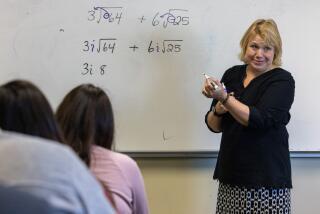Kids and parents turn to coding to boost college, career prospects

Jared Flores loved the two weeks he spent this summer at a computer coding school where he programmed a hand-crafted robot that could steer itself through a maze.
Aside from the knowledge he gained, the 14-year-old Fullerton boy figures he came away with something just as important.
“I know if I continue down this path, I can get into any college that I want,” said Jared, who enters high school next month.
Interest in computer coding is surging for a growing number of students stoked by popular computer gaming and smartphone apps — and hoping for a crucial leg up when applying to college and launching careers.
Students and their parents view coding as an indispensable skill in the digital era, especially since the number of programming-related jobs is projected to soar in the next decade.
“Most of them have said, ‘This is my ticket into a better school, my ticket to a better scholarship or my ticket to a better job,’” said Ben Sanders, an instructor in Jared’s class. “They all enjoy it, but they’re not just coming here for that reason.”
Not everyone agrees that studying programming in the middle or high-school years is the key to collegiate or professional success, but that hasn’t slowed the coding juggernaut.
Coding is taught by at least 371 private entities, including specialized websites, adult boot camps and children’s summer camps, according to the nonprofit Kapor Center for Social Impact in Oakland. Of the 153 that disclosed how long they’ve been in business, 108 were launched in the last three years.
At iD Tech Inc., which runs the technology camp that Jared attended on UCLA’s campus, the number of students studying coding at its camps nationwide more than tripled to 14,878 this year from 4,276 three years ago. Coding-related classes swelled to 21 from 8.
Proponents said programming ability will be in high demand in countless industries.
“Every kid learns about photosynthesis or the basics of electricity or what H2O stands for,” said Hadi Partovi, co-founder of Code.org, a nonprofit that advocates for computer education in schools.
“In the 21st century, it’s just as important for every kid to get a basic understanding of what an algorithm is or how the Internet works or what does SSL stand for,” he said.
By 2020, there are projected to be 1.4 million computer-related jobs, but only 400,000 students majoring in computer science, according to Code.org.
Wall Street has taken note. Venture capital giant Kleiner Perkins Caufield & Byers, for example, has invested in Codecademy in New York. Others picking up venture funding include Flatiron School Inc. in New York and Treehouse Island Inc. in Orlando, Fla.
Interest in programming among students and parents springs partly from the omnipresence of technology in children’s lives. The ability to develop a computer game or smartphone app has become — if not cool — at least a lot less nerdy.
“To start from nothing and create an entire game is really interesting to me,” said Warner Scheibe of Temecula. The 16-year-old was at iD Tech studying how the programming worked on Minecraft, a popular computer game.
Economic fear also plays a role for some students at a time when college graduates, even those brandishing degrees from top schools, struggle to find good jobs.
The unemployment rate for people in their 20s is above the 6.2% national average, according to the Bureau of Labor Statistics. It was 10.5% in June for people ages 20 to 24, and 7.2% for those 25 to 29.
About 46% of recent college graduates say they are underemployed, according to a survey this year by management consulting firm Accenture. That’s up from 41% last year.
That contrasts with the seemingly limitless fortunes of tech workers, said John Boudreau, research director at the Center for Effective Organizations at USC’s Marshall School.
“You see these emerging tech-based companies with lots of coders with many headlines about great wealth being created there,” Boudreau said.
It remains to be seen whether the dash into coding is overdone.
Just as when people studied Japanese in the 1980s, flocked to Web design in the 1990s or became real estate agents in the last decade, those seeking programming skills face unclear prospects.
“I’m not so sure that coding skills are universally relevant to the future in a vast amount of employment,” Boudreau said. “Just not everybody is going to be coding, even though it’s an important thing.”
Even some tech evangelists acknowledge the limits.
Broad computer-science skills that include technological awareness and analytical thinking are more important than narrow programming skills, Hartovi said.
“Learning how to code in any one particular [computer] language is not going to be worthwhile beyond 10 or 20 years,” he said. “Learning how to problem-solve using algorithms and how technology works and how it’s built is going to last a century at least.”
Coding expertise doesn’t guarantee entrance to elite colleges either.
Taking outside courses can help a student get into UCLA, said Gary Clark, the university’s admissions director. But coding doesn’t win extra points.
“I would not say coding is seen as any better or worse than any other educational pursuit a student might seek outside of the school,” Clark said.
Even so, students are cramming into schools such as iD Tech.
The Campbell, Calif., company launched in 1999 at the height of the dot-com frenzy with 270 teenagers. Except for a lull from 2007 to 2009, iD Tech has grown steadily. Total enrollment, beyond just coding, topped 36,000 this year, up from 19,498 in 2011.
“Our company has definitely been in the right place at the right time,” said Alexa Ingram-Cauchi, co-founder and president.
In its marketing, iD Tech isn’t shy about emphasizing the potential for a career boost.
“I got my programming start at iD Tech, then graduated from MIT in three years and now work as a Product Manager for Zynga,” one alumnus enthuses in a brochure.
The school holds classes at more than 80 college campuses nationwide, including Harvard, Yale and Stanford. It has seven locations in Southern California, including UCLA and UC San Diego.
Tuition is pricey. A one-week class goes for $799 to $949, depending on the courses and location. A two-week course at iD Tech’s programming academy, in which students bunk on campus, costs $3,699.
The students at iD Tech show a clear passion for coding. But that’s not the case everywhere, said Reid Warren, a 12-year-old from Manhattan Beach.
At one coding school he attended, some youngsters complained that their parents forced them to go, Reid said.
“Some of them said, ‘This is not my choice. If I didn’t have to, I wouldn’t be here,’” he said.
For Jared, this is his third iD Tech camp. He went to his first one at UCSD at age 7. He and his parents stayed in a hotel because he was too young to bunk on campus.
This summer’s two-week program was half the price of a full year at Jared’s private school last year.
“He’s getting something out of it, but these camps are not cheap,” said his mother, Lani Flores.
Her son sees a lot of benefit in associating with other programmers.
“It can get lonely if you’re just in your room all the time programming, but [here] I can meet people,” Jared said. “When I say something, they all understand what I’m talking about.”






